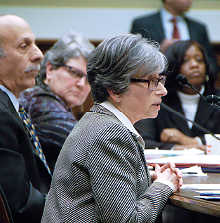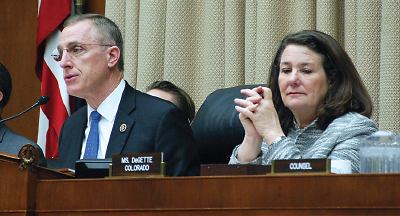Members of Congress excoriated two key federal health agencies at a February 11 hearing, complaining about poor coordination and evaluation of programs supporting people with serious mental illnesses.
The hearing by the House Energy and Commerce Subcommittee on Oversight and Investigations coincided with the release of a report requested by the subcommittee and issued by the Government Accountability Office (GAO). The report covered 112 government programs targeting mental illness but concentrated mainly on the 30 nonmilitary programs.
The GAO recommended that the Department of Health and Human Services (HHS) establish an interagency mechanism to coordinate the programs. It also called for HHS and the departments of Defense, Justice, and Veterans Affairs to determine when and how their programs should be evaluated.
Formal interagency coordination is lacking now, in part because the body established for that purpose, the Federal Executive Steering Committee for Mental Health, has not met since 2009, said Linda Kohn, Ph.D., the GAO’s director of health care. HHS does have a Behavioral Health Coordinating Council, but it functions only within that department.
“We are concerned that the lack of coordination inhibits an understanding of the federal footprint in this area,” Kohn told the subcommittee. “Coordination helps identify overlaps and gaps to maximize existing resources.”
After reviewing the report, HHS and the Substance Abuse and Mental Health Services Administration (SAMHSA) rejected the recommendations, leading to harsh criticism by subcommittee chair Tim Murphy (R-Pa.).
“HHS is essentially saying there is no room for improvement,” said Murphy in his opening remarks. “This is unbelievable. This is a clear example of unaccountable government—one that refuses to recognize its failings even when presented with constructive recommendations for improvement.”
GAO encountered several problems in producing the report. For one thing, the agencies it contacted had difficulty simply identifying all relevant programs within their departments. A program aimed at reducing homelessness might serve some people with mental illness but might not be specifically targeted at them. Responses from the agencies thus varied in completeness because of differing standards.
In addition, there was no consensus among the participants on the definition of “serious mental illness.” The GAO report referred to current or past-year presence of “a diagnosable, mental, behavioral, or emotional disorder [based on DSM criteria] … that resulted in serious functional impairment. …” Others on the panel suggested some definition incorporating a combination of diagnosis, functioning, and patient history, including trauma.
Also, only nine of the 30 nondefense programs had completed evaluations, leaving the agencies (and the GAO) in the dark about program effectiveness.
Officials from HHS and SAMHSA defended their agencies at the hearing.
The GAO report was remiss in not covering reimbursement programs such as Medicare, Medicaid, or the military health insurance program Tricare, noted Richard Frank, Ph.D., assistant secretary for planning and evaluation at HHS.
“The problem is that if you leave out Medicare and Medicaid, you’re not seeing the whole picture,” he said. Medicare and Medicaid together account for 40 percent of mental health spending compared with just 5 percent of expenditures by HHS and SAMHSA; 55 percent is covered by private insurance, he said.
Furthermore, the sort of coordination recommended in the GAO report was unneeded, said Frank: “HHS recognizes the need to coordinate at the agency, program, provider, and individual levels, but people with mental illness don’t live their lives at program boundaries.”
SAMHSA Administrator Pamela Hyde, J.D., went even further in defending her agency’s performance.
“The recommendation was about a specific type of infrastructure that we think is not going to make a difference on the ground,” she said. “One high-level federal coordinating body is not going to solve the problem.”
Most subcommittee members appeared to disagree. Murphy, a clinical psychologist, is preparing comprehensive mental health legislation that would include a high-ranking coordinator within HHS (see page 11).
“I hope there are ways we can work through these issues and concerns on a bipartisan basis,” added ranking committee member Diana DeGette (D-Colo.). “We should work together to put the lessons learned in our oversight hearings into practice.” ■
The House of Representatives’ webcast “Federal Efforts on Mental Health: Why Greater HHS Leadership Is Needed” can be accessed
here. The GAO report, “HHS Leadership Needed to Coordinate Federal Efforts Related to Serious Mental Illness,” is available
here.


